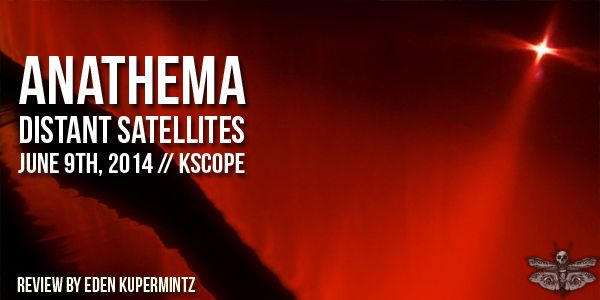
Truly great albums are more than the sum of their parts. A good rule of thumb for an album that will last beyond a few months is that uneasy feeling that rises when someone asks you exactly what you like about it. If you can quantify it into this song or that riff, it’s probably going to wear out its welcome pretty soon. Anathema‘s last album, Weather Systems, was exactly that: a piece of art that breathes and lives on its own, detached from any one track or sound. With Distant Satellites, one of the key bands in the movement from doom/black towards electronic music and pop show us that such transitions hold within them the power to elevate an album from a collection of songs towards something greater: yet another earnest step in the illustrious career of this veteran band.
Right off the start, it is obvious that the weight and presence of Weather Systems is impossible to ignore. Like the previous album, this one starts with a track in two parts: the first filled with the power pop approach that is the staple sound for the band and the second a touching iteration on the same theme. However, the difference shines through on The Lost Song Part 2. Lee Douglas is given a much more central role than before, unaccompanied by Vincent Cavanagh this time. Her voice is even more impressive than before, holding untold amounts of emotion, whether in the highs or somber lows.
The companion piece to the first two songs, Dusk (Dark is Descending) is perhaps one of the best Anathema tracks to date. The dual approach to vocals returns, with Douglas and Cavanagh delivering a convincing and masterful performance. The instruments however are what sets this track apart, with the guitar and drums working together to create a certain urgency to the track. From here, all the way to the seventh track, things progress pretty much as expected. Ariel is poignant yet positive, in that special Anathema way, while The Lost Song Part 3 and Anathema are true tear inducers. This part of the album is slightly underwhelming, especially after the brilliant initial trio. The tracks sound great but compared to the mid section of Weather Systems, they fail to truly touch the already captured listener.
Have no fear though; Anathema are far from done. The seventh track, You’re Not Alone, is where this album proves that Anathema are still a young band at heart, willing to innovate and explore new sounds. The interesting influence introduced is none other than Radiohead, with faster paced electronic beats taking the reins. While these sounds were hinted at in previous releases, they were never realized to such an extent: bass-laden beats take the place of piano, backed by furious guitars which reminds one of Steven Wilson‘s heavier passages on records such as Insurgentes or Fear of a Blank Planet. Nor does this sound relent. It continues with us all the way to the last track which, while being slower and more emotional, does not discard the electronic and beat based approach.
Distant Satellites is an impressive feat for such a veteran band. It seems Anathema are not willing to rest, even after having reinvented themselves not once but twice during their career. Nowhere is this more evident than in the title track. An eight minute long piece
, the track utilizes the same electronic beat approach as before but lets it breathe, utilizing a broad canvas to fully explore this new sound. The result is emotional, brilliantly composed and fully realized by talented musicians. This track and its eponymous albumshow us that Anathema are gimmick free. Any transitions these virtuous artists choose to make are driven by a deep commitment to music and the pulsing heart of the band: emotions, vocals and broad sound-scapes.
Anathema’s Distant Satellites gets…

4.5/5
-EK